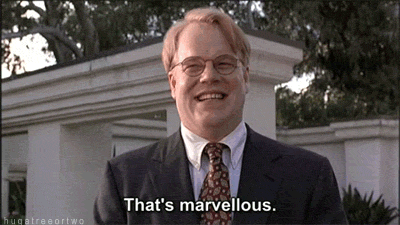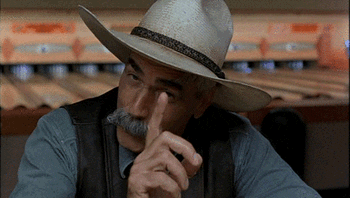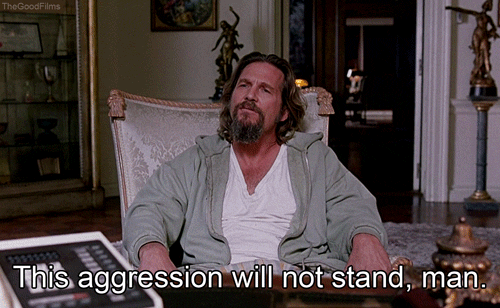Sometimes there's a man... Sometimes, there's a man: A man who drives a rusted, beat-up Ford Torino and writes cheques for litres of milk. A man who cares about interior design. A man who’s most comfortable in baseball-tees and jelly sandals or just a robe. For recreation, this man drives around, bowls and has the occasional acid flash back. He does Tai Chi in his robe with a white Russian in one hand. He’s unemployed and doesn’t want kids but he does have a special-lady-friend who he’s helping to conceive. This man takes relaxing baths surrounded by candles and serenaded by whales. His best buddies are Walter and Donny. This man calls himself His Dudeness, Duder, or El Duderino, if you’re not into the whole brevity thing. This man is The Dude.
The Big Lebowski is, without a doubt, the movie I have seen more than any other. I can give you a play by play account of the whole film, quote entire scenes off by heart and can sing along to the soundtrack without missing a beat. Until recently I would have said, unequivocally, that The Big Lebowski was my favourite movie of all time. I don’t remember when I actually saw The Big Lebowski for the first time but, I know that by the time I was 17 and lost my shit when I found a copy of the soundtrack on sale in a music store in Pairs (I had failed to source one in Ireland), I was already obsessed. Why a 17-year-old nerd who had never smoked a blunt in her life was obsessed with a middle-age stoner drop-out, The Dude, is a complicated question, with a lotta ins and a lotta outs.
The Big Lebowski is a 1998 neo-noir, comedy, caper set in L.A. during the early 90s. Directed by the Coen Brothers, the film was a near flop in the cinema but has turned into a cult classic that has, literally, spawned its own religion ‘Dudeism.’ In a case of mistaken identities The Dude – aka Jeffrey Lebowski (Jeff Bridges) – finds himself victim of a home invasion where two hired thugs physically assault him, demand he pays off his debts to local pornographer, Jackie Treehorn (Ben Gazzara), and pee on his rug. Seeking compensation for his soiled rug, he tracks down the real Lebowski (David Huddleston), a local millionaire, and takes a replacement home. In the meantime the wife of millionaire Lebowski, Bunny (Tara Reid), goes missing and a ransom note is received demanding one million dollars for her return. The Dude is hired to make the payoff but all goes array when Walter (John Goodman) switches the suitcase for a wringer. Chaos ensues and The Dude’s johnson, and perhaps his life, are in danger as all interested parties (and there are many) begin demanding the money from him.
The Dude abides
There is so much to say about The Big Lebowski that has already been said in so many places. People have written literal theses on this film, but I’m going to keep this one really short and really personal.
Except for buying the sound-track in France during my final year French exchange I have no recollection of ever watching The Big Lebowski before this. My teenage years are full of these kinds of memory gaps, a result, I suspect of the intolerability of life at home and in school and my tendency to dissociate. It was not until I finished secondary school, and I found myself abruptly ejected from my mother’s home and living in house belonging to a friend, that The Big Lebowski became my ultimate comfort movie and The Dude my hero. Alone in the house which had been in the process of renovation for at least ten years, I spent many an evening chasing away solitude and anger with the easy laughs of The Dude’s misadventures.
By the end of that year I knew the dialogue by heart and the soundtrack too. I started drinking white Russians, dudeisms had well and truly infiltrated my vocabulary and I started hosting my first The Big Lebowski nights. These consisted of inviting friends over, to wear bathrobes, drink white Russians and share an optional blunt.
In a life of movie obsessions, The Big Lebowski has probably been my most enduring. My estimation of friends and lovers depended on whether or not they liked it. I had t-shirts and stickers. I never made it to The Dude Fest but I treated myself to a week in New York for my 30th birthday (I had never been) and made sure I visited The Little Lebowski store in Greenwich Village on an itinerary that also included MOMA, Ellis Island and the Empire State building.
Soon after my little pilgrimage, however, I found myself taking some distance from the movie for the first time in 15 years. It felt too wrapped up with the kind of woman I thought I had to be: one who was down with the ‘bros’ and whose internalized misogyny continued to disparage art made by women until well into my 20s. It was intimately tied to my once-upon-a-time attraction to similarly childless and feckless, slacker dudes with substance abuse issues. And, like most early Coen movies, I had been introduced to The Big Lebowski by my father, and I began to wonder how much of my love for this movie was wrapped up with the need for my father’s approval. Until my early 20s when the veil well and truly slipped off, I was a little Jesse Eisenberg trying to please and appease Jeff Daniels (so many Jeffs this week!) in The Squid and the Whale. It was imperative that I read the right books, watched the right movies, listened to the right music and had all the right opinions – opinions which, of course, aligned with my father’s. And my relationship with The Big Lebowski was, for a time, tainted by these uncomfortable legacies.
Since discovering my autistic identity, however, I have found myself coming back to The Dude and his misadventures trying to figure out what it was about this ageing stoner and veteran of the 60s that so appealed to a queer and autistic millennial.
I could be sitting here with pee stains on my rug!
Trouble starts for the Dude with a case of mistaken identity and escalates the more he engages with the square world, whether it is the millionaire philanthropist, his conceptual artist daughter, porn producers or the Chief of Police of Malibu. With each encounter his car gets a little more dinged up, his house a little more trashed and his body a little more abused.
On a meta-level he begins to lose his own sense of self and identity. His insistence that he is The Dude, and NOT Jeffery Lebowski, is constantly eroded by the squares he meets along the way, most of whom refuse to use his chosen name. He begins to accept whatever people have decided to call him without pushback.
Interestingly, Brandt, the millionaire Lebowski’s assistant, in the performance by Philip Seymor Hoffman (RIP) that won my heart forever, is the only square that readily adopts The Dude’s chosen name.
It is Walter - the gun wielding, veteran with an explosive temper and probable PTSD - who becomes the voice of reason amidst the chaos. Walter points out that in his escalating anxiety over the money and Bunny’s whereabouts he has become ‘very undude.’ It takes a night of ‘coitus’ with Maude (Julianne Moore) and a well-timed blunt for him to realise just how uptight he has become because of his entanglements with the square world. The Dude returns to himself and his life of ease, not any richer but at least with a replacement rug – it really did tie the room together.
Strikes and gutters, ups and downs
The Dude is someone who cares little for the false respectability of the square world and has few ambitions, except perhaps for winning his bowling league. He’s smart, and educated, and he’s done things (college occupations of various administration buildings, and a string of random jobs). He sees through the artifices of the squares he encounters, whether it is the reactionary authority of Malibu’s Chief of Police or the pretension of Maude’s art world.
Having always struggled with the demands of ‘adulting’ and full-time employment, the contradictions, incoherencies and control embedded in institutions of all kinds, the Dude’s ‘abiding’ philosophy has been balsam since my teens. The Dude is content on the margins of society, bowling, driving around and enjoying the occasional acid flashback. My version of this reality, is one where I can get up when I want, stay at home in my pyjamas until lunch time, slip into some lounge wear, log on to my computer and read or write undisturbed until 9 or 10pm. I have, to a great extent managed thanks to the possibilities offered by freelancing and academia, but the cult of ambition and the expectations imposed by the square world are hard to let go of completely.
It is the promise of easy money brings the Dude into contact with the square world and chaos reigns, only in relinquishing wealth can he return to the serenity of his previous existence. This perpetually stoned, ageing, hippie in jelly sandals continues to give me hope it is possible to escape the rat race and still thrive.
That about does her, wraps her all up… catch you later on down the trail!
PS: Some other things I love about this movie:
Aimee Mann and Flea’s cameos as German nihilists; Steve Buschemi as the soft spoken Donnie; the Dude, Donnie and Walter as beta-male anti-heroes; an epic soundtrack that only makes sense in the context of the movie but which introduced me to Kenny Rodgers, Creedence Clearwater Revival and others; the talking tumble weed; White Russians; green toenails; sliced toes; Maude’s bob; interpretive dance; Peter Stormare in a red jumpsuit brandishing a giant scissors; friends with cleft arseholes; yappy Pomeranians; fragile pacifists; flying carpets; flying mugs; the In-and-Out Burger; bowling pin head pieces; scattering ashes from a Ralphs’ tub; sarsaparilla; The Stranger’s moustache and The Dude’s echolalia.*
One thing I don’t like: 25 years later, it’s fair to say we could have been spared John Tuttorro’s deeply problematic Jesus character without losing anything from the movie.
*I’m not sure I would say The Dude is an autistic coded character, though he does have a penchant for comfy clothing and self-medicates with drugs and alcohol. He also displays, throughout the movie, the common autistic trait of echolalia in his speech patterns. He absorbs phrases, ‘parlance’, from the world around him and repeats them back during his encounters when he feels the context is appropriate, though sometimes mixing meanings or metaphors. Some choice lines include:
A young trophy wife, in the parlance of our times…
Sometimes the you eat the bear and, sometimes…
Mr. Treehorn treats objects like women, man!
I often experience echolalia after enjoying a movie and will repeat particularly satisfying phrases (see the set images for each edition of this newsletter for evidence) for hours or days. When it came to The Big Lebowski my echolalia lasted for years, with whole chunks of dialogue from the movie becoming part of my vocabulary!








